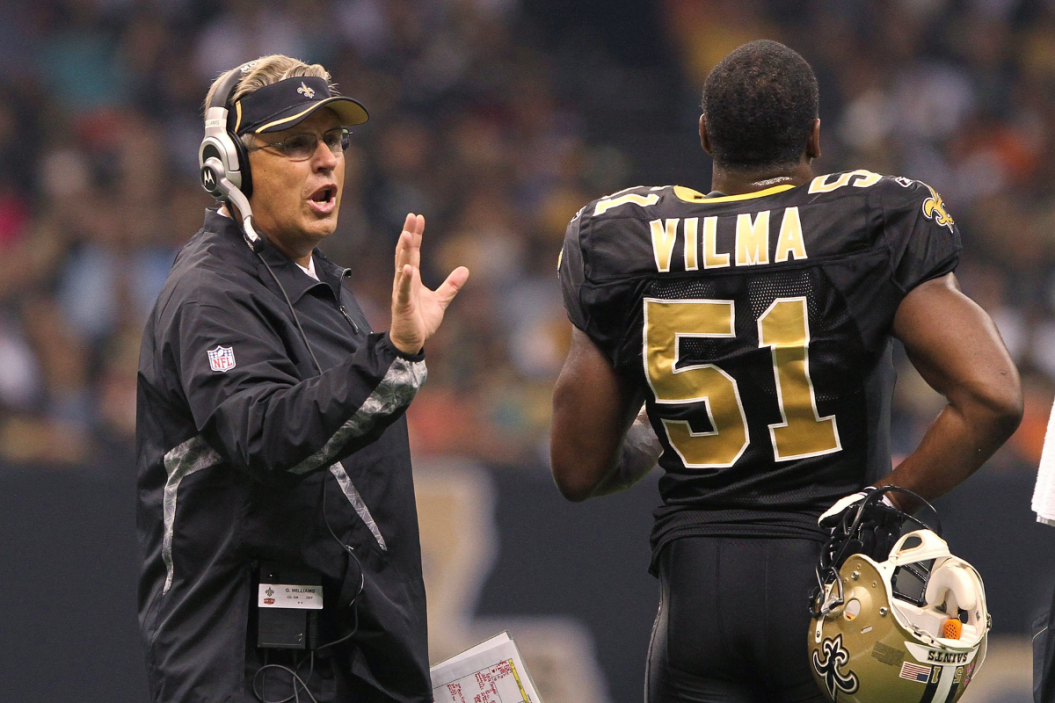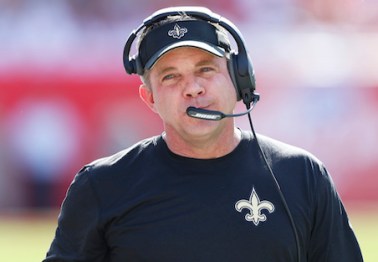The biggest scandals in sports history are those that change their respective sports forever. Consider how the Chicago Black Sox fixing the 1919 World Series transformed the sport of baseball. Some wrongdoings are just too important to ignore.
The NFL, too, has encountered its fair share of scandalous behavior. The New England Patriots came under fire for their roles in Spygate in 2007 and Deflategate in 2015. The 1989 Bounty Bowl, in which Philadelphia Eagles coach Buddy Ryan ordered a bounty on a Dallas Cowboys kicker and quarterback, rocked the sport as well.
Sometimes coaches and players forget that football is a game. It's not war. It's not life or death. At the end of the day, they should be able to shake hands, congratulate each other and leave everything on the field.
The New Orleans Saints, from 2009-11, did no such thing. You know where this is heading. I'm talking about Bountygate.
What Was Bountygate?
January 24, 2010: The Saints beat the Vikings 31-28 in Overtime in the NFC Championship Game.
The game would later be referred to as ?The Bountygate Game.? pic.twitter.com/xti6ngR0Me
— This Day In Sports Clips (@TDISportsClips) January 24, 2021
Essentially, the Saints' bounty scandal involved NFL players and coaches pooling money together into a "slush fund" and paying players for injuring certain opposing players. An estimated 22-27 Saints players participated in the bounty program put in place by Saints defensive coordinator Gregg Williams, and NFL commissioner Roger Goodell wound up imposing some of the harshest penalties the league has ever seen.
It all began in the 2009 NFC Championship game between the Saints and Minnesota Vikings. Or at least that's when opposing teams began to raise their eyebrows.
The Saints defeated the Vikings in overtime, 31-28, but after the game Vikings players, coaches and front office officials claimed Saints defenders were intentionally trying to hurt Vikings quarterback Brett Favre. Vikings coach Brad Childress counted at least 13 instances that game, one of which involved defensive end Bobby McCray and defensive lineman Remi Ayodele combining for a high-low hit on the Hall-of-Fame quarterback.
Payouts could range from as little as $100 for pinning a kick returner inside the 20-yard line to $1,000, $1,500 or $2,000 for knocking a player out of a regular season game and as much as $10,000 for knocking one out of a playoff game. In one instance, Saints linebacker Jonathan Vilma offered $10,000 to anyone who knocked Favre out of that NFC Championship game.
Vikings owner Zygi Wilf went to the NFL with the accusations and Vikings players like Chris Kluwe and Ryan Longwell immediately speculated if a bounty had been placed on Favre. The Saints went on to win the Super Bowl that year, but trouble soon followed.
How Bountygate Was Discovered
An anonymous tip — later revealed to be fired defensive assistant Mike Cerullo, per ESPN —led to an NFL investigation in 2010, but it wasn't until March 2012 that the league announced it obtained evidence Williams was behind the bounty system.
What's more is that it revealed Saints head coach Sean Payton not only knew about the plot but also tried to cover it up once the NFL began investigating. Saints general manager Mickey Loomis failed to shut down the operation as well, despite orders from Saints owner Tom Benson.
The NFL found Favre was not the only target in 2009, nor was Bountygate limited to one season. Arizona Cardinals quarterback Kurt Warner was targeted in the 2009 playoffs, as well as Green Bay Packers quarterback Aaron Rodgers, Carolina Panthers quarterback Cam Newton and Seattle Seahawks quarterback Matt Hasselbeck during 2011, supposedly the last season the bounty system was administered. It appeared no one was off limits, whether it was a key player for the Chicago Bears, Detroit Lions, Pittsburgh Steelers or even Tom Brady. Though, there's no evidence to support the latter.
Many current and former Saints players partook in the system, but the ringleaders were identified as Williams and Vilma. New Orleans running back Reggie Bush's agent, Michael Ornstein, also contributed to the pot on multiple occasions.
Saints quarterback Drew Brees denied he knew of the bounty system in place.
Penalties, Fines & Suspensions
Karma from 2009 NFC Championship game and bountygate ¯_(?)_/¯ https://t.co/Y9GfQck8x9
— Connor Smelser (@CSmelser21) January 21, 2019
RELATED: Roger Goodell's Staggering Net Worth Proves He Could Retire Today
Goodell absolutely brought the hammer down on the Saints. Coaches' suspensions were upheld but player suspensions were overturned by former commissioner Paul Tagliabue, who Goodell appointed to hear their appeals.
- Gregg Williams suspended indefinitely, eligible to apply for reinstatement at end of 2012 season
- Sean Payton suspended for the entire 2012 season
- Mickey Loomis suspended for first eight games of 2012 season
- Assistant head coach and linebackers coach Joe Vitt suspended for first six games of 2012 season
- Saints fined $500,000
- Saints forfeited 2012 and 2013 second-round NFL draft picks
- LB Jonathan Vilma suspended for entire 2012 season
- DT Anthony Hargrove suspended for eight games
- DE Will Smith suspended for four games
- LB Scott Fujita suspended for three games
The NFLPA called the suspension unjustified and claimed Goodell hadn't provided enough evidence to support the sanctions. While players were allowed to play in the following 2012 season, the Saints finished 7-9 and missed the playoffs without their longtime head coach.
Vitt served as interim head coach through training camp and preseason before serving his suspension in 2012.
Who Was Involved in Bountygate?
No chance the Titans get something worse. Bountygate suspensions:
* Payton: season
* GW: indefinite
* Loomis: eight games
* Vitt: six games
* Vilma: season
* Hargrove: eight games
* W. Smith: four games
* Fujita: three gamesAlso docked two 2nd rd picks, plus max team fine https://t.co/nx8xmKUO4L
— Reid (@ReidG75) October 8, 2020
Saints head coach Sean Payton, defensive coordinator Gregg Williams, assistant coach Joe Vitt, general manager Mickey Loomis and sports agent Michael Ornstein were all found at fault in the scandal. Team owner Tom Benson earned praise for ordering Payton and Loomis to put an end to it when he found out.
Players that faced suspensions included linebacker Jonathan Vilma, defensive tackle Anthony Hargrove, defensive end Will Smith and linebacker Scott Fujita. An estimated 22-27 total New Orleans Saints players participated in the bounty program, though.
Bountygate Evidence and Audio
Filmmaker Sean Pamphilon uncovered and released audio of Williams prior to the Saints' playoff game against the San Francisco 49ers in 2012. Williams' profanity-laden speech was disgusting, disturbing and borderline sociopathic.
Here are a few lines from it. (WARNING: It is very NSFW.)
"Kill the head and the body will die. We've got to do everything in the world to make sure we kill Frank Gore's head. We want him running sideways. We want his head sideways."
"We hit f***in' Smith right there. (Williams points to his chin) Remember me, I've got the first one, I've got the first one. (Williams rubs together his fingers indicating cash payment) Go lay that motherf***er out."
"Every single one of you, before you get off the pile, affect the head."
"We need to decide whether Crabtree wants to be a fake a** primadonna, or he wants to be a tough guy. We need to find that out. He becomes human when we f***in' take out that outside ACL."
Williams goes on to tell his players to attack tight end Vernon Davis' ankles and attack a wide receiver that had concussions in the past.
Michael Irvin said he almost threw up when he heard the line about Crabtree's ACL. Some media members, like Fox Sports' Mark Kriegel, said Williams deserved to be banned for life from the NFL following the audio tape.
Instead, Williams has maintained a lengthy NFL coaching career post-Bountygate scandal. He worked with the St. Louis Rams (now the Los Angeles Rams), Tennessee Titans and Cleveland Browns following his Saints stint. He most currently served as the New York Jets defensive coordinator before being let go after the 12th game of the 2020 season.
Allegations against Williams imposing bounties on players date back to his coaching days with the Washington Redskins (2004-07) and as the head coach of the Buffalo Bills (2001-03). Multiple former Redskins players came forward to the Washington Post accusing him, as did former Bills players to The Buffalo News.
Williams has claimed that bounties have long been part of the NFL, but one still has to wonder why Goodell didn't make more of an example of Williams so youth, high school and college players don't get any ideas.
Bountygate was one of the biggest scandals in NFL history. It put an enormous stain on the New Orleans Saints organization and in the minds of Saints fans, which is especially sad given their 2009 Super Bowl win following much of the city's destruction caused by Hurricane Katrina in 2005.
No one will ever forget it, especially in Louisiana.
This article was originally published July 23, 2019.

